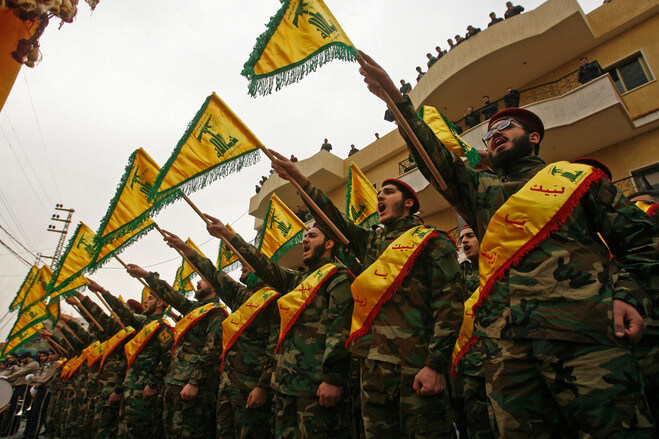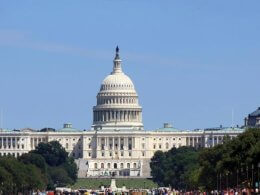A Lebanese journalist with connections to Hezbollah stated that the group was ready to use irregular weaponry against Israel.
Ibrahim Al-Amin, board chairman of the pro-Hezbollah Lebanese newspaper Al-Akhbar, threatened Israel against starting a war against Lebanon or else Hezbollah would use unconventional weapons.
Al-Amin's article was a commentary following a speech given by Hezbollah Secretary-General Hassan Nasrallah, which assessed what he saw as the achievements of Hamas’s Al-Aqsa Flood campaign and ended with a threat that if Israel thought of starting a war against Lebanon, Hezbollah's fighting would "be without any limits, rules or constraints."
"This is not the first time Hezbollah's leaders threaten to use unconventional weapons against Israel or their other enemies," explained Dr. Walid Phares, foreign policy expert and author.
"Let's remember that their ally, the Assad regime, used chemical weapons against his own Syrian civilians; hundreds, maybe thousands, died, including children," he added.
Referring to Nasrallah's speech, Al-Amin said that the Secretary-General was "tougher and more decisive regarding the options of the resistance in Lebanon vis-a-vis the all-out war that Israel and the United States are waging against Palestine, Lebanon, Yemen, Iraq and all the way to Iran.[Nasrallah] did not hide the existence of a serious possibility that the situation on the Lebanese front will deteriorate into an extensive war," Amin said.
He described the rules of the ongoing conflict between the Iranian-backed terrorist group Hamas and Israel before the Oct. 7 massacre as "collapsed."
"The enemy is trying to impose new rules, and it is doing so [by means of action] on the ground, not through diplomacy, and based on its perception – which is apparently shared by its American and European allies and even by some Arabs and Lebanese – that the resistance is deterred otherwise it would have entered the war with all its force from the very first day," Amin explained.
On Nasrallah's threat against Israel should the Jewish state launch a war into southern Lebanon, Amin said that the Secretary-General was telling Jerusalem that the "Lebanese resistance rejects the new rules of the conflict, that the assassination of [Saleh] Al-Arouri, [the deputy head of Hamas’s political Bureau], mandates a response that will restore the previous [state of] deterrence, and that the resistance will carry out this response sooner or later."
According to Phares, Hezbollah's specialty is mass bombing, from the "US Marines barracks in Beirut in 1983 to bombings across the Middle East, and even as far as the AMIA bombing in Argentina in 1994, and in the Arab world all the way to Saudi Arabia."
Phares explained that the "Khomeinist terror organization is ideologically prepared to use weapons of mass destruction."
"From the slogan used by Hezbollah, the Houthis to Iran's regime, the slogan of 'death to Israel, death to America' if it means anything in the world of possible scenarios is the final intention of physical elimination of their enemies, namely Israel and America," Phares told The Foreign Desk.
"If the enemy foolishly retaliates against the response of the resistance, it will find itself involved in this extensive war. In this case, [the war] will not have limits of any kind, even if the [Israeli] war on Gaza ends or will be close to ending. For the resistance in Lebanon, whose role is [also] connected to what is happening in Syria, Iraq, Yemen, and all the way to Iran, will have the last word," Amin added.
The Lebanese journalist noted that the most critical sentence in Nasrallah's recent speech was: "[There is need] to prepare for a war without constraints and without limits." "This indicates that the first lesson learned from the Gaza war is that the resistance must prepare for a different kind of confrontation against the enemy's enormous firepower," he said.
Amin explained that the ongoing Gaza war has "invalidated" past perceptions and that if Israel "miscalculates," it would "have to prepare for [a scenario in which] Hezbollah will use its firepower against the depths of [Israel's territory] in a different way."
Phares notes that the most efficient weapons for Hezbollah to achieve their slogans and ideology would be "weapons of mass destruction, from chemical, biological, all the way to nuclear."
The terrorist group, according to Phares, would be able to obtain such weaponry from money transferred under the Iran deal to Tehran, making it easy for Hezbollah to buy material and actual "WMDs on the international market, including from former soviet states."
"With the type of ballistic weapons Hezbollah has, it is only logical to project that these long-range missiles are deployed to be equipped with WMDs. But more ominous would be the use of nuclear weapons. Strategically, it would be difficult for Hezbollah to deploy ICBMs in Lebanon with classical large-size nuclear bombs," he told The Foreign Desk.
Such a scenario, according to Amin, would "not be a building for a building, but rather tens of thousands of fatalities within the enemy entity in retaliation for thousands of fatalities in Lebanon."
The Lebanese journalist noted that any reasonable individual should understand that the weapons that Hezbollah would use in any future conflict would "certainly not be conventional weapons."
"These statements are surely not to the liking of the occupation. You have been warned," he said.
Following the Oct. 7 massacre at the hands of Hamas, Hezbollah and other Iranian-backed proxies in Yemen, Syria, and Iraq voiced support for the Hamas attack, providing military assistance against Israeli and American forces in the Middle East region.
Despite warnings from Israel about joining the conflict, Hezbollah continues to launch missiles against Israel's Northern Border, prompting the Israeli Defense Forces (IDF) to prepare its troops for a possible invasion of southern Lebanon.
According to Phares, the likely scenario for Hezbollah would be to obtain tactical nukes, either from Iran when it gets them or "purchase them directly from rogue regimes in Asia or eventually in Latin America, possibly from former soviet stocks."
"A nuclear-armed Hezbollah is by far a cataclysmic danger to Israel, across the border, and the time for launch and hitting targets in central Israel may be in few minutes," he added.
In the past, Phares predicted that there were two "triggering events" for Hezbollah and Tehran to use WMDs or tactical nukes against Israel and eventually against the US if it was part of the war.
"For Hezbollah, it would be if a ground offensive would reach the southern suburb of Beirut, the "capital" of the Lebanese-based Iranian militia."
"Israeli cities will be targeted if Dahiye (southern suburb) would be about to fall," Phares
stated.
Another instance where WMDs or tactical nukes are used against Israel, according to Phares, would be if the Islamic Republic of Iran was "about to fall, via outside military action or even under a revolution.
"For Iran and Hezbollah to possess WMDs and nukes, it would be the closest to an apocalypse if either one of them is about to fall," Phares said.
Related Story: Hezbollah Threatens Israel with ‘Fighting Without Limits’










